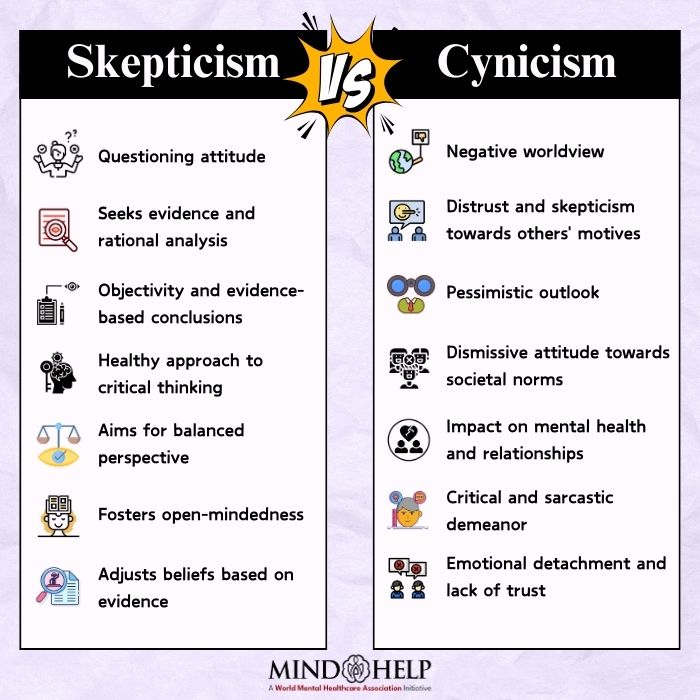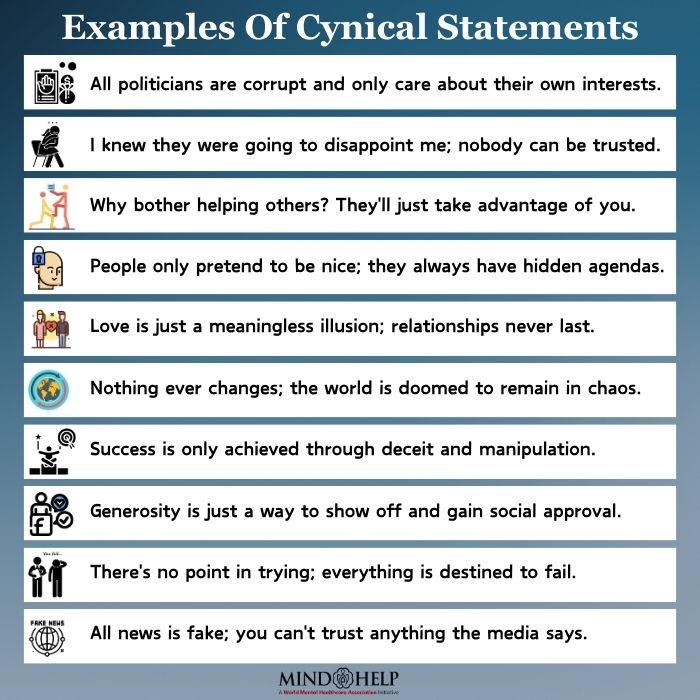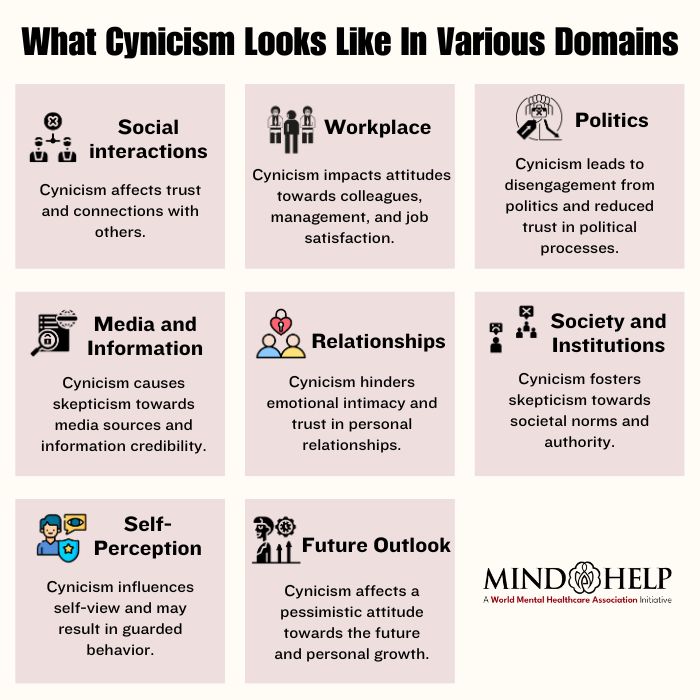Table of Contents
Cynicism is a belief system or attitude marked by a general distrust of others’ motives, especially regarding sincerity, integrity, or altruism. Cynics often assume that people act primarily out of self-interest, even when they appear to be doing something noble or generous.
There are two main contexts:
Philosophical Cynicism (Ancient Greece): Originated with Antisthenes and was later developed by Diogenes. This school of thought promoted a life of virtue in accordance with nature, rejecting materialism and social conventions.
Modern Cynicism: More commonly, it refers to a skeptical or pessimistic attitude where individuals doubt the goodness of human intentions or institutions, often leading to sarcasm, criticism, or disengagement.
What Is Cynicism?
Cynicism is both a philosophical and psychological stance marked by deep skepticism and a general distrust of others’ motives and sincerity. Those with a cynical outlook often perceive human behavior as primarily driven by self-interest, viewing acts of kindness or morality with suspicion. They tend to reject conventional social norms and values, regarding them as hypocritical or lacking genuine intent.
This worldview is rooted in the belief that people act primarily to fulfill their own desires, without genuine concern for others or higher principles. Cynics may adopt a critical and sarcastic demeanor 1 Neumann, E., & Zaki, J. (2023). Toward a social psychology of cynicism. Trends in cognitive sciences, 27(1), 1–3. https://doi.org/10.1016/j.tics.2022.09.009 as a defense mechanism against perceived deception and disingenuousness in the world.
Read More About Defense Mechanism Here
In daily life, cynicism can have both positive and negative impacts 2 Stavrova, O., & Ehlebracht, D. (2019). The Cynical Genius Illusion: Exploring and Debunking Lay Beliefs About Cynicism and Competence. Personality & social psychology bulletin, 45(2), 254–269. https://doi.org/10.1177/0146167218783195 on well-being and mental health. On the positive side, it can protect individuals from naivety and prevent them from being easily deceived or manipulated. However, excessive cynicism can also lead to feelings of alienation, isolation, and negativity, affecting one’s overall mental well-being.
Characteristics Of Cynicism
The common characteristics 3 Hershey, M. S., & Stoddard, H. A. (2021). A Scoping Review of Research into the Origins of Cynicism Among Medical Trainees. Medical science educator, 31(4), 1511–1517. https://doi.org/10.1007/s40670-021-01328-5 of cynicism include:
- Skepticism and distrust of others’ motives
- Belief in selfish human behavior
- Dismissal of conventional social norms as hypocritical
- Critical and sarcastic demeanor
- Emphasis on individual independence and self-sufficiency
- Rejection of material possessions and social status
- Focus on inner virtue and simplicity of life
- Challenging societal conventions and authority
- Value placed on honesty and authenticity

Cynicism In Cinema
Cynicism in cinema is powerfully portrayed through iconic characters such as Tony Stark in the Iron Man franchise (2008–2013), as well as in films like Fight Club (1999), American Psycho (2000), and Joker (2019). These stories delve into characters who view society through a sharply critical lens, often embracing moral ambiguity and exposing the darker sides of human nature. Such films resonate with audiences by unpacking the roots and repercussions of cynicism, while challenging traditional notions of heroism and blurring the line between protagonist and anti-hero in modern culture.
What Causes Cynicism?
Experts 4 Mills, C. M., & Keil, F. C. (2005). The development of cynicism. Psychological science, 16(5), 385–390. https://doi.org/10.1111/j.0956-7976.2005.01545.x researching into what causes cynicism point to the following developmental factors:
- Negative past experiences or betrayals
- Observing dishonesty or hypocrisy in others
- Feeling disconnected or disillusioned with society
- Perceiving pervasive corruption or unethical behavior
- Exposure to cynicism from influential figures or media
- Psychological defense mechanism against vulnerability
- Lack of trust-building experiences or positive relationships
- Personal feelings of powerlessness or lack of control
- Cultivation of critical thinking without balance in perspective
How Cynicism Affects Mental Health
Research into how cynicism affects mental health claim that cynicism and mental health are inversely related 5 Qin, Z., Liu, C., Guo, X., Meng, C., Gao, J., Lv, J., Hu, Y., Yuan, T., Liang, L., Li, C., Fei, J., Zou, L., Zhang, H., & Mei, S. (2023). The influence of subjective well-being on mental health in nursing students: the role of student cynicism. Psychology, health & medicine, 28(5), 1358–1367. https://doi.org/10.1080/13548506.2021.2019807 , impacting both emotional well-being and interpersonal relationships. Excessive cynicism can lead to feelings of chronic pessimism, hopelessness, and disillusionment.
Individuals who carry deep mistrust and persistent skepticism toward others often find it difficult to experience joy or a sense of purpose, increasing their vulnerability to mood disorders such as depression and anxiety. This cynical outlook can lead to social withdrawal, fostering feelings of alienation and loneliness that further worsen mental health.
Read More About Anxiety Here
Cynicism also takes a toll on relationships. Constant suspicion, criticism, and emotional guardedness can erode trust and hinder meaningful connections, often resulting in misunderstandings and conflict. Over time, this may distance the individual from valuable sources of support and empathy.
Moreover, a cynic’s negative mindset can affect the emotional tone of their social environment, contributing to increased stress and tension not only for themselves but for those around them.

Mental Illness Associated With Cynicism
Common mental health conditions 6 Hershey, M. S., & Stoddard, H. A. (2021). A Scoping Review of Research into the Origins of Cynicism Among Medical Trainees. Medical science educator, 31(4), 1511–1517. https://doi.org/10.1007/s40670-021-01328-5 triggered by cynicism include:
- Major depressive disorder (MDD)
- Generalized anxiety disorder (GAD)
- Paranoid personality disorder
- Avoidant personality disorder
- Antisocial personality disorder (in extreme cases)
- Substance use disorders (self-medication)
- Post-traumatic stress disorder (PTSD) (if cynicism stems from trauma)
- Social anxiety disorder (SAD) (related to interpersonal difficulties)
- Borderline personality disorder (BPD) (interpersonal struggles and emotional instability)
Read More About Major Depressive Disorder (MDD) Here
What Is Cynicism In The Workplace?
Cynicism in the workplace can create a toxic and disengaging atmosphere. When employees adopt a cynical outlook, they may become distrustful of their colleagues, management, and the organization as a whole 7 Volpe, R. L., Mohammed, S., Hopkins, M., Shapiro, D., & Dellasega, C. (2014). The negative impact of organizational cynicism on physicians and nurses. The health care manager, 33(4), 276–288. https://doi.org/10.1097/HCM.0000000000000026 .
This can lead to decreased teamwork, collaboration, and communication, as well as a lack of enthusiasm for work-related tasks. Organizational 8 Durrah, O., Chaudhary, M., & Gharib, M. (2019). Organizational Cynicism and Its Impact on Organizational Pride in Industrial Organizations. International journal of environmental research and public health, 16(7), 1203. https://doi.org/10.3390/ijerph16071203 cynicism can also erode employee morale, potentially resulting in:
- Higher turnover rates
- Increased risks of burnout
- Reduced productivity
- Reduced job satisfaction
- Reduced work motivation
How To Overcome Cynicism
Consider the following measures 9 Stavrova, O., & Ehlebracht, D. (2018). Education as an Antidote to Cynicism: A Longitudinal Investigation. Social psychological and personality science, 9(1), 59–69. https://doi.org/10.1177/1948550617699255 on how to overcome cynicism:
- Practice self-awareness and recognize cynical thoughts and attitudes.
- Challenge negative assumptions and beliefs about others’ motives.
- Seek support from friends, family, or a therapist to discuss and process emotions.
- Engage in activities that foster positive emotions and a sense of well-being.
- Cultivate empathy and understanding by considering others’ perspectives.
- Focus on building positive and genuine relationships with trustworthy individuals.
- Limit exposure to excessively negative media or influences.
- Practice gratitude and focus on the positive aspects of life.
- Adopt a more balanced and realistic perspective on human behavior.
- Set realistic expectations for others while acknowledging imperfections.
Read More About Empathy Here

Takeaway
While cynicism can act as a protective shield against gullibility, excessive cynicism often takes a toll on mental health and emotional well-being. Gaining insight into the roots and traits of cynical thinking can help individuals better understand its influence on their thoughts, behaviors, and relationships.
By cultivating self-awareness and practicing empathy, individuals can begin to challenge cynical patterns, develop healthier perspectives, and build more meaningful connections with others.
At A Glance
- Cynicism is both a philosophical and psychological attitude defined by deep skepticism and distrust of others’ motives and intentions.
- Key traits of cynicism include a questioning mindset, critical outlook, and general wariness toward human sincerity. While some level of cynicism can promote caution and protect against deception, research shows that it can also have significant effects on mental health—both positive and negative.
- When cynicism becomes excessive, it may contribute to issues such as depression, anxiety, and difficulties in forming or maintaining relationships.
- Overcoming harmful levels of cynicism often involves cultivating self-awareness, practicing empathy, and embracing gratitude as part of a more balanced and constructive mindset.
Frequently Asked Questions (FAQs)
1. What are some examples of cynicism?
Examples of cynicism include believing that everyone is motivated by self-interest, dismissing acts of kindness as insincere, and assuming that people will always let you down.
2. Who is a cynical person?
A cynical person is someone who consistently views the world and others with skepticism, distrust, and negativity.
3. Can cynicism be positive?
Yes, cynicism can be positive as it can protect individuals from being easily deceived or manipulated and promote critical thinking and discernment.
4. Can cynicism be toxic?
Yes, cynicism can be toxic as it can lead to a pessimistic outlook, strained relationships, and hinder personal growth and well-being.
5. What causes cynicism in the workplace?
Cynicism in the workplace can be caused by perceived workplace injustice, lack of trust in leadership, or unmet expectations.















